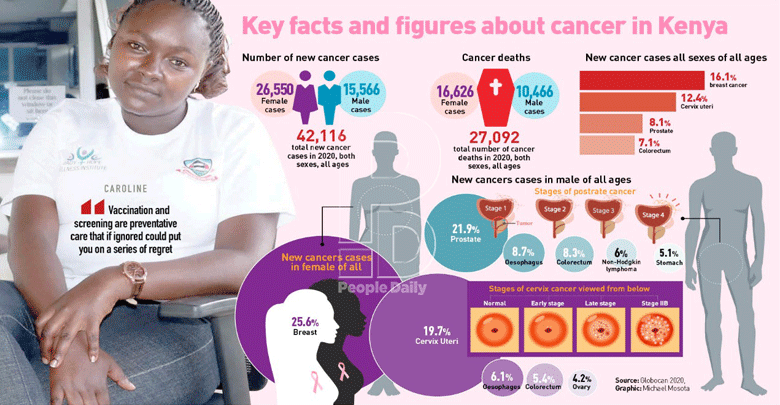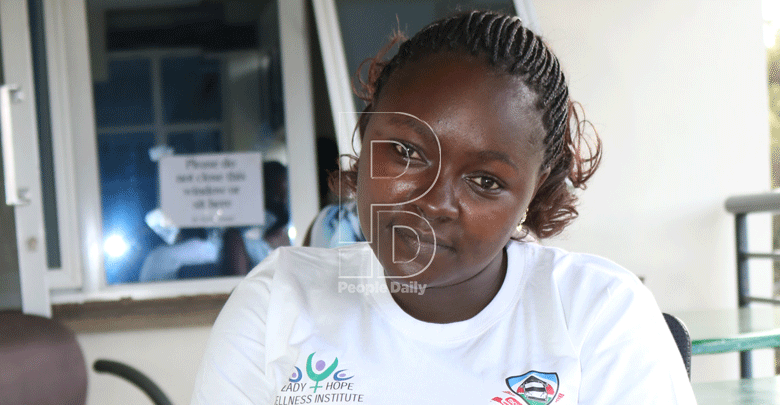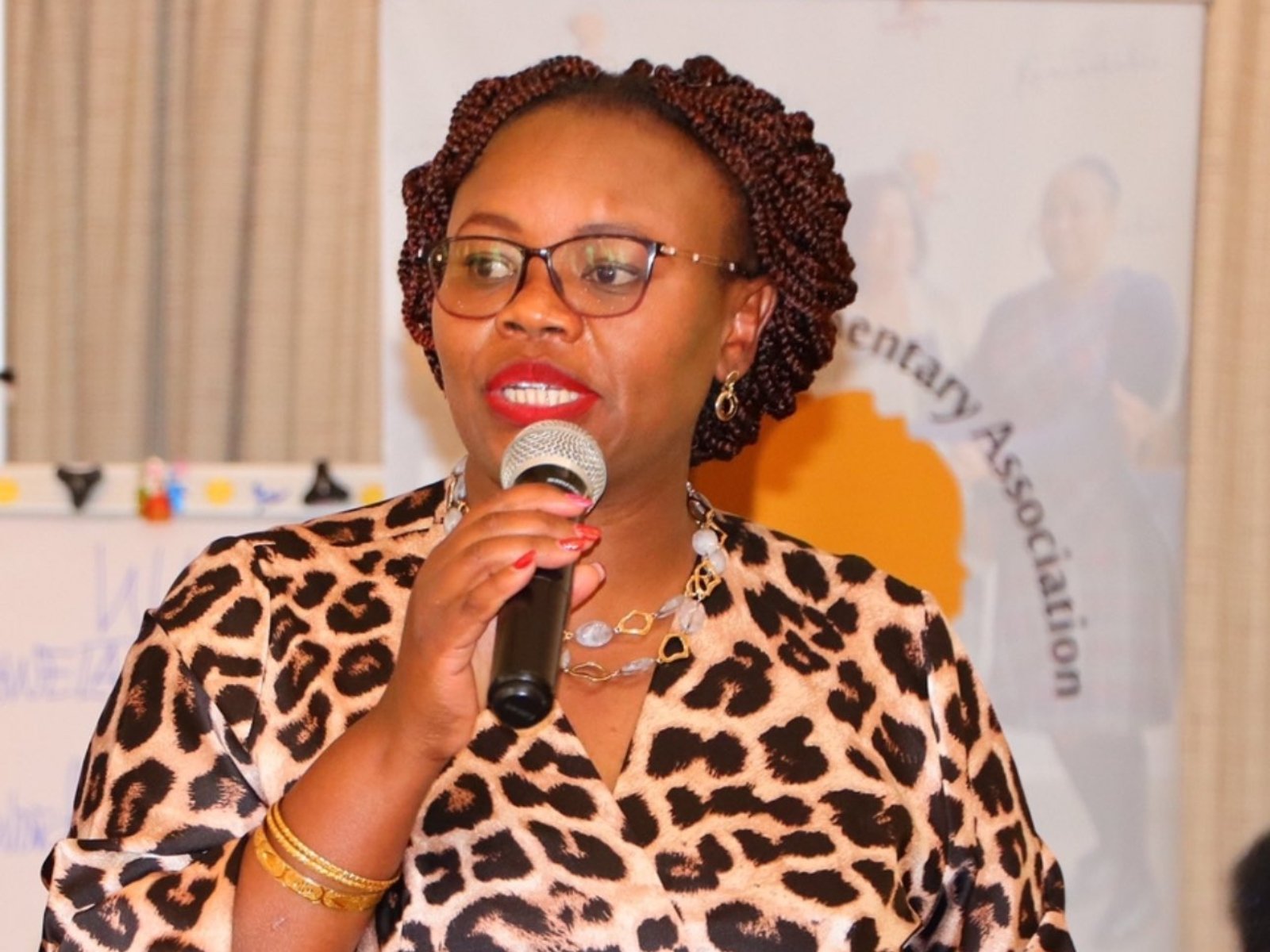I am paying the price of ignoring screening

Sandra Wekesa @wekesa_sandra
Foul smell, bleeding between periods and after intercourse, burns from wounds around her vagina and pelvic pains just enough to get her out of bed sums up the struggle 27-year-old Caroline Wanjiru goes through daily.
Although she is quite scared about her slowly deteriorating health, she is hopeful she would be able to stay healthy long enough to see her two children, aged seven and two, grow.
When Caroline was diagnosed with stage IIA cervical cancer, she felt overwhelmed.
With little information about it, she would scout the internet and other sources provided it was associated with cancer.
Before her diagnosis, she was just a normal girl trying to make the best out of life.
“I was the most normal 24-year-old. My ex-husband and I had one child, a boy, and we were expecting a girl in a few months,” she recalls.
Then, she would always put off her regular scheduled pap smear because, as a young woman in her 20s, she didn’t think it was necessary.
How it started
In 2018, when she was two months pregnant with her last born, she got a vaginal yeast infection.
Although it was treated, the symptoms persisted and after some tests her doctor told her it had advanced to pelvic inflammatory diseases.

By then, the discharge had become too much and the odour unbearable.
The doctor recommended a pap smear, but Caroline declined since her family didn’t have a history of cervical cancer.
On the fourth month of pregnancy, she developed more complications. Her amniotic fluid drained and the pain became unbearable.
She was booked for an emergency caesarean delivery and delivered her bundle of joy at 1.8kg.
However, during the operation, doctors noticed a block of mass on her cervix.
“I remember the doctor asking me if I had considered that pap smear and I would brush them off with an assurance that I was okay.
But they insisted that something wasn’t right during delivery and needed to be looked at carefully,” Caroline narrates.
She gave in and went for the test. She knew it is a simple test and results would come back negative, so she didn’t pay much attention to it. But as fate would have it, her results came back positive.
“When I was called in to the hospital I kept on wondering how exactly that could be possible.
I remember looking at the doctors and asking them if they were sure about the results and they kept telling me yes.
This was so hard for me to bear and my mind immediately switched to how my children will live.
My ex-husband was taken through what cervical cancer meant and its effect on our marriage and he seemed to be okay with the few changes,” she recalls.
After two months of staying in hospital, she was referred to Kenyatta National Hospital to begin her treatment.
Commuting to hospital daily, with a small child that needed her attention, was the hardest part, but she eventually got the hang of it.
The miscarriage
Determined to save her marriage, Caroline would occasionally have intercourse with her husband, even when he demanded.
“I remember one time, he insisted on getting intimate with me and I couldn’t refuse.
He penetrated me so hard, pushing the block of mass into my uterus. I ended up getting a rupture and had to go for a minor surgery,” she says.
Caroline explains with cervical cancer, she couldn’t be on any form of family planning because they would have led to complications.
It was no surprise, therefore, that a few months later she was pregnant, this time round with twins.
Her doctors, however, advised her to terminate the pregnancy, but Caroline was positive the foetuses would survive. They seemed to be doing well until the fifth month when she miscarried.
“The news didn’t sit well with my husband, who kicked me and our children out.
Through my family and friends, I was able to get back on my feet and start a new life,” she says.
Shortly after, while undergoing chemotherapy, Caroline started developing severe chest pains.
This time round, she did not think twice about getting a check-up, and was diagnosed with Stage IIB leukaemia.
She had to adapt to daily clinic routines for blood transfusion, and a weekly chemotherapy session.
Her life revolves around her home and hospital. Her biggest regret is that she never knew regular screening would have saved her situation.
“Vaccination and screening are preventative care that if ignored could put you on a series of regret for the rest of your life,” she says.
In numbers
Cervical cancer is the primary cause of cancer death among women in the country, at 3,211 cases according to Global Cancer Observatory (Globocan), a number projected will more than double by 2040.
The World Health Organisation estimated in 2018, 570,000 infections and 311,000 cases worldwide. As at 2020, Globocan estimates new infections at 604,127 and deaths at 341,834.
Dr Khadija Warfa, consultant gynaecologic oncologist at Aga Khan University Hospital, says all women are at risk of cervical cancer. It occurs in women over 30 years, although anybody can get the disease caused by the Human papillomavirus (HPV)
“HPV is a common virus passed from one person to another during sex. Most sexually active people will have HPV at some point in their lives, but only few women get cervical cancer,” she says.
Cervical cancer and precancer lesion can be detected through a pap smear test. Although screening could be uncomfortable, there is no pain.
Dr Warfa adds that the most common symptoms of cervical cancer are irregular or heavy vaginal bleeding, bleeding after sex, watery, mucoid or foul smelling vaginal discharge, bowel and urinary symptoms such as pressure-related complains and vaginal passage of urine or stool. Advanced disease may present pelvic or lower back pain.
“In asymptomatic women, cervical cancer may be discovered upon pelvic examination which should be done frequently.
Treatment depends on stage, health and age. The most common treatment for early stage cervical cancer is radical hysterectomy.
The alternative is always radiation therapy, given in combination with chemotherapy,” she says.
Dr Karen Muthembwa, obstetrics and gynaecology resident at Kenyatta National Hospital, explains that women aged between 25-64 years are advised to get pap smears after every three years.
However, HIV infected women are advised to go after every year.
“Although HPV is acquired through sexual intercourse, men are carriers, but women tend to bear the cross of having to deal with cervical cancer.
But this doesn’t mean that HPV can’t affect men, in fact, statistics show that HPV is linked to anal and throat cancer in men, “she says.
Cervical cancer survivors face a lot of stigma. They have to shy away from from speaking ups because of being judged and accused of having had multiple sexual partners.
Caroline, for example, says she has faced rejection from friends and has been forced in many circumstances to explain the condition has got nothing to do with her lifestyle.
Political goodwill
In Kenya, despite the on-going burden of cervical cancer, strong political will and commitment has led to progress in recent years, including through the national roll-out of the HPV vaccine into the routine immunisation schedule in October 2019.
Laikipia First lady Maria Mbeneka says one of the biggest challenges in the county is ensuring women visit the hospital and attended both antenatal care visits and screening regularly.
Mbeneka says thanks to the free screening services, in 2018, they got about 24 cases of cervical cancer.
As of last year, the cases had shot up to 54, a clear indication that women had started embracing regular screening.
She says that encouraging women to consider screening as soon as they were done with the antenatal care visits played a major role.
“I would often visit the hospital to encourage mothers to consider screening even after birth and give them information why it is necessary for their children to receive the HPV vaccine,” she says.








